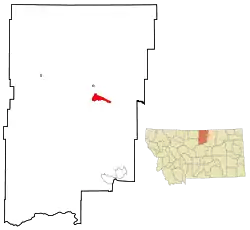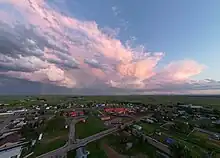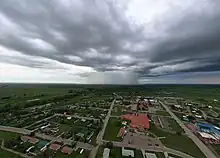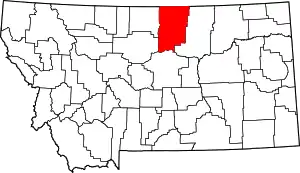Fort Belknap Agency, Montana
Fort Belknap Agency is a census-designated place (CDP) in Blaine County, Montana, United States. As of the 2020 census, its population was 1,567. This is a significant increase from the 2010 census which reported 1,293 residents.[2]
Fort Belknap Agency, Montana | |
|---|---|
 Location of Fort Belknap Agency, Montana | |
| Coordinates: 48°28′8″N 108°45′19″W | |
| Country | United States |
| State | Montana |
| County | Blaine |
| Area | |
| • Total | 45.76 sq mi (118.52 km2) |
| • Land | 45.50 sq mi (117.85 km2) |
| • Water | 0.26 sq mi (0.66 km2) |
| Elevation | 2,375 ft (724 m) |
| Population (2020) | |
| • Total | 1,567 |
| • Density | 34.44/sq mi (13.30/km2) |
| Time zone | UTC-7 (Mountain (MST)) |
| • Summer (DST) | UTC-6 (MDT) |
| Area code | 406 |
| FIPS code | 30-27850 |
| GNIS feature ID | 0771503 |
Fort Belknap Agency is the capital of the Fort Belknap Indian Reservation.
Geography
The Milk River forms the CDP's northern border.
According to the United States Census Bureau, the CDP has a total area of 45.8 square miles (118.5 km2), of which 45.5 square miles (117.8 km2) are land and 0.27 square miles (0.7 km2), or 0.56%, is covered by water.[2]


Demographics
| Census | Pop. | Note | %± |
|---|---|---|---|
| 2020 | 1,567 | — | |
| U.S. Decennial Census[3] | |||
As of the census[4] of 2000, 1,262 people, 345 households, and 287 families were residing in the CDP. This grew to 1293 in the 2010 census and 1,567 in the 2020 census. The population density in 2000 was 116.4 people/sq mi (45.0/km2). The 380 housing units averaged 35.1/sq mi (13.5/km2). The racial makeup of the CDP was 2.61% White, 0.32% African American, 95.64% Native American, 0.08% Asian, 0.16% Pacific Islander, and 1.19% from two or more races. Hispanics or Latinos of any race were 1.51% of the population.
Of the 345 households, 50.7% had children under the age of 18 living with them, 40.9% were married couples living together, 32.8% had a female householder with no husband present, and 16.8% were not families. About 14.2% of all households were made up of individuals, and 3.2% had someone living alone who was 65 years of age or older. The average household size was 3.64, and the average family size was 4.00.
In the CDP, the age distribution was 41.8% under 18, 12.4% from 18 to 24, 25.2% from 25 to 44, 16.3% from 45 to 64, and 4.3% who were 65 or older. The median age was 22 years. For every 100 females, there were 90.6 males. For every 100 females age 18 and over, there were 88.9 males.
The median income for a household in the CDP was $22,000, and for a family was $23,583. Males had a median income of $26,364 versus $20,833 for females. The per capita income for the CDP was $9,053. About 37.9% of families and 38.3% of the population were below the poverty line, including 39.0% of those under age 18 and 56.1% of those age 65 or over.
Education
Students from kindergarten to 12th grade attend public school in Harlem,
Aaniiih Nakoda College offers associate degrees in eleven disciplines and vocational training in five others.
Infrastructure
Fort Belknap Agency is located at the northern end of the reservation at the junction of U.S. Route 2 and Montana Highway 66.
It is the home of facilities such as the Fort Belknap Hospital, an office of the Bureau of Indian Affairs, the Fort Belknap Tribal Council and Tribal Police, and a highway rest area.
The nearest commercial airport is Havre City–County Airport, 50 miles (80 km) east. It offers regional flights only. For full flight service, residents must travel to either Great Falls International Airport or Billings Logan International Airport, both about 200 miles (322 km) away.
Notable people
- George Horse Capture, Native American anthropologist and writer, was born here.
- James Welch, Native American author, went to school here.
References
- "ArcGIS REST Services Directory". United States Census Bureau. Retrieved September 5, 2022.
- "Geographic Identifiers: 2010 Demographic Profile Data (G001): Fort Belknap Agency CDP, Montana". U.S. Census Bureau, American Factfinder. Archived from the original on February 12, 2020. Retrieved June 25, 2013.
- "Census of Population and Housing". Census.gov. Retrieved June 4, 2016.
- "U.S. Census website". United States Census Bureau. Retrieved January 31, 2008.
- "KGVA". FCC. Retrieved October 3, 2023.
